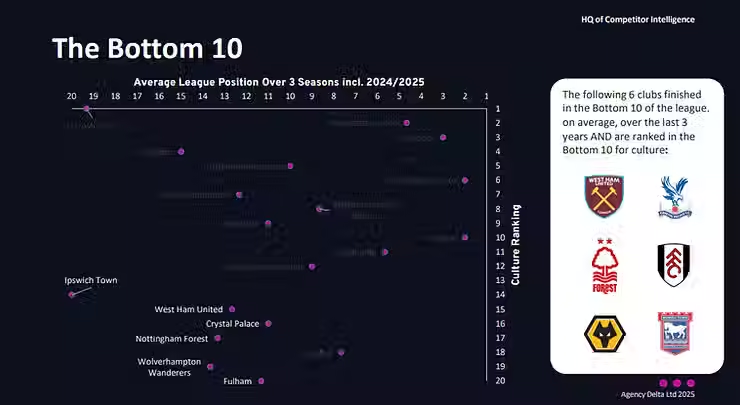What the Premier League Table can teach us about culture
- John Crossan

- Jun 16, 2025
- 4 min read
There’s a story unfolding in Premier League football that isn’t about transfers, tactics, or trophies. It’s about culture. And it’s not being told by managers, players, or the press, but by sentiment data. This puts evidence behind a topic that we usually have to guess at. One that media coverage can easily skew our views in favour of or against, a club… What is the culture of a given club really like?
And if you’re into culture, as we are, is there a link between their internal culture and league performance?
Deltabase, a powerful open-source competitor intelligence platform, has released data that backs up our belief, suggesting that there is a positive correlation between each club’s culture and its place on the league table.
They’ve captured Net Sentiment Scores (NSS) across all Premier League clubs for the 2024–25 season. These are based on signals from the public domain like employee voice, customer reviews, job ads, news coverage, and annual reports. So, while the data isn’t coming directly from dressing rooms or training grounds, or from the kind of deep cultural diagnostic we carry out with clients, it does paint a reflection of each club, in terms of how it’s experienced by staff, fans, candidates and customers – at least based on data that’s publicly available.
While not painting the complete performance or cultural picture, the data does start to imply how patterns of behaviour that are encouraged, discouraged, and tolerated by clubs, over time, have an impact on each club’s overall outcome. And those patterns are what create culture.
How do the clubs’ cultures compare to the league table?
When you plot these culture scores against average league performance over the last three seasons, a few stories could be implied by the data.
Six clubs that have finished in the top ten in the Premier League (on average, over the period) also rank in the top ten for culture. Four of them - Liverpool, Newcastle, Manchester City, and Arsenal - haven’t dropped out of the top half of the league table in that time. An interpretation of this could be that not only can a high-performing culture fuel high-performance on match day, but it could also set the club up for sustained success.

There’s another story to be told with Brighton and Spurs, who also rank in the top 10 for culture. Brighton finished 6th in 22–23, dropped to 11th in 23–24, then bounced back to 8th in 24–25. Spurs posted 8th and 5th-place finishes in 22-23 and 23-24, respectively. The club had a dismal 24–25 league season but did bag a victory in the Europa League. While there may be other factors at play that prevent both teams from consistently performing at the top of their game, the data does suggest that their culture promotes resilience.
Tie it all together, and you could argue that these aren’t just high-performing teams, but high-performing organisations. The way they operate behind the scenes supports what we see on the pitch.
What about clubs that ranked in the bottom half for culture?
Four of them - West Ham, Crystal Palace, Fulham, and Wolves - have averaged bottom-half finishes in the Premier League table over the last three years as well. With just the one season in the Prem to measure, Ipswich ranked 14th for culture and has been relegated.

You could easily argue that West Ham, Palace, and Fulham have been solid mid-table performers rather than genuine relegation candidates. But Deltabase hasn’t included data for the teams relegated during the three years – the very worst performers. Would that strengthen the link between culture and performance, or weaken it? Over to you, Deltabase…
Of course, there are outliers. Chelsea has had strong league finishes despite ranking 18th for culture. Similarly, Forest, who ranked 17th for culture, has just finished 7th in the 24–25 season. Leicester on the other hand, even with the top culture rating, was relegated twice during the three years, while Everton ranked fourth for culture but has been stuck in the bottom half of the table, narrowly escaping relegation in 22-23 – though the club’s league position has risen three years on the bounce.
The grey area of measuring high-performance
Of course, it’s not all black and white. Not only will there be factors at play outside of culture that are impacting overall team performance, but there could also be plenty of factors relating to culture that are causing disparity.
For example, a club that’s perceived to have a positive culture but isn’t performing may be experiencing misalignment between the culture they have and the culture they need. Or a club, may be in the process of changing their culture, which will take time to reflect in team performance as employees accept and adapt to change. We recently touched on this in a piece about Manchester United, who, interestingly, sits directly in the middle of Deltabase’s table and is undergoing a cultural change with INEOS.

What does all of this data tell us?
Nothing conclusive yet, but it does reinforce the idea that culture won’t always save you short-term, but it can build resilience and support long-term progress. It also reinforces that culture isn’t just an internal concern. It affects reputation as well as performance, because so much data can be found in the public domain.
Finally, it reinforces the idea that if you want sustainable high performance, you can’t focus only on the ‘sharp end’ of the organisation (the playing staff, in this example). You have to look at the whole system and value everyone’s experiences.
Through the patterns of behaviour that are encouraged, discouraged, or tolerated by people and systems over time, culture is shaping what people actually experience. And it’s doing it every day, in Premier League football clubs, and in your organisation.
What are you rewarding in your organisation, subtly or explicitly? What’s being frowned on, or quietly tolerated? Do these things really support your performance goals?
Find out more about how we can help you assess and optimise your culture, or if you have any questions, get in touch with Fraser to understand how your culture can support your overall organisational performance.



Comments